MEMORIES of PORT GERMEIN 1920s-1940s
MORE ABOUT PT GERMEIN
|
BRENDA's MEMORIES
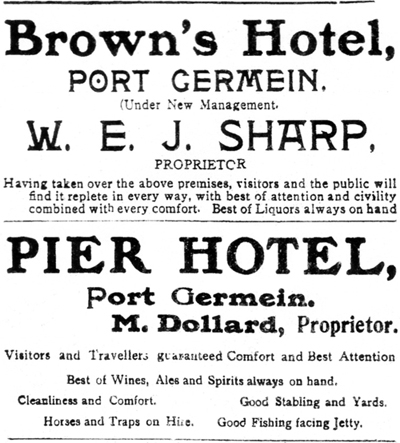 I was born on a farm just north of Port Germein in 1925, and lived there until
the early forties.
I have treasured memories of Port Germein:
I was born on a farm just north of Port Germein in 1925, and lived there until
the early forties.
I have treasured memories of Port Germein:
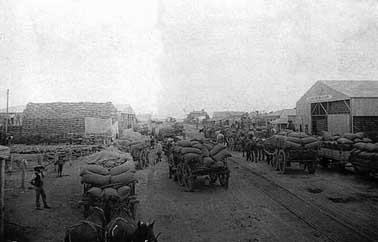
- Long walks along the jetty, and paddling in the water left by the tide underneath it.
- The beautiful sailing ships that came from so many different countries.
- The scene of two sailing ships loading at the jetty, one at anchorage and another coming in near sunset with all its sails billowing.
- Going on to one of the sailing ships, the 'Winterhude,' with my father and meeting the captain.
- High and huge stacks of wheat along the main street, all the way from the train shed up to Goode's store. In the late 30s and early 40s it was always busy.
- So many men, heavy sacks on their backs, loading the wheat on to the trucks, the whole town a hive of activity.
- The busy little engine pulling loads of wheat up the jetty.
- There were some street lights, gas operated.
- Mr and Mrs Havers had a bank in their house. Miss Bryden was the postmistress for many years and Bill Stokes was the policeman.
- Late 30's and early 40's people by the name of Fairey owned the hotel. Remember them well.
- There was an Aboriginal camp on the eastern side of the ranges near the Baroota Creek. They had a tiny iron church where I would sometimes go to a service. It was dark inside apart from the frightening (to a little girl) whiteness of the teeth of the choir!
- New Year's Day - the beach packed with cars and people, horses and buggies tied up wherever.
- Lovely picnic lunch - cold turkey and cold plum pudding all shared with lots of family.
- Rolling around in the seaweed - I loved it and the smell of seaweed.
- New Year's night - the dance in the Palais - my parents made beds for my younger siblings behind the seats while they danced the night away, in favourites like the Canadian Barn Dance, Military Two Step, Pride of Erin, Tango, Two Step, Valeta.
- During the intervals of the dancing, we older children loved sliding on the shining, slippery dance floor.
- Claude Carnell and his band from Port Pirie often played for dances in the Palais. He owned the Music Store in Port Pirie, in Alexander Street at the time.
- I think the first people having the Palais were named Laver but I remenber Colin and Clarice Mitchell. They made the first icecream, churning it themselves in a small wooden churn packed with ice around the churn part. The vanilla icecream was very creamy, almost pale yellow. It tasted great. Then of course, Moyles drinks, ice blocks etc.
- The dances at the Institute - for years my grandmother, Agnes Glasson, played the piano for all the balls and dances in the 20's and early 30's. Mr Billy Hoskin played the button accordion.
- Strawberry Fetes were the highlight of the year. I remember the first present I received from Father Christmas at one, a string of blue beads.
- The RSL concerts in the thirties which my father helped organise - Buster Noble the clown and his small daughter Patsy Ann and other artists from the city.
- Being taught to dance by my Uncle on the lovely jarrah floor in the Institute.
- Anzac Day - with a huge crowd at the monument and men dressed in uniform and my Dad giving the orders.
- In January 1973, Joan Mitchell's mother, Clarice, along with her sister Rhoda Sutton, Madge Elliott-Price and Jean McMurtrie were at my home in Adelaide for the celebration of my parents' 50th wedding anniversary. Most of them went to school with my mother.
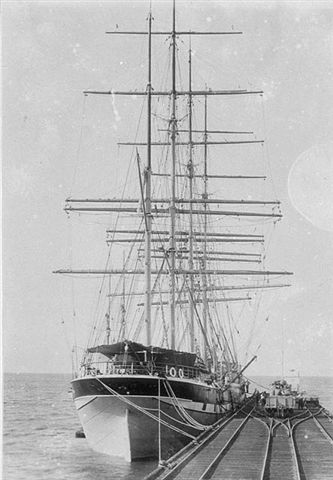
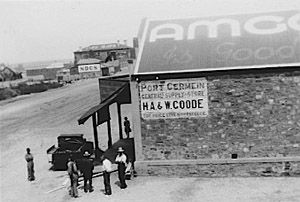
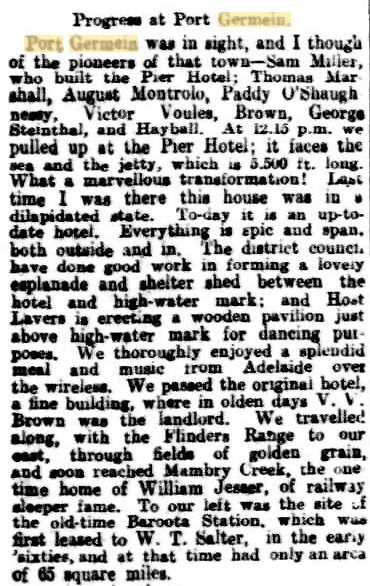
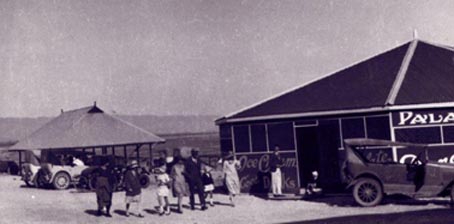 I visited Port Germein about a month ago and it brought back all the good
memories. There are many more.
I visited Port Germein about a month ago and it brought back all the good
memories. There are many more.
Brenda Leitch
Pictures :
Ads from The Trans Continental newspaper, Port Augusta, 1915
The barque Earl of Dunmore at Port Germein jetty (R. Shaw)
Wheat carts in the main street, Pt Germein (R.Shaw)
Goode's shop, 1930s (B. Leitch)
Beach Palais, Pt Germein (R. Shaw)
Extract from article entitled Ride About Out West, from The Register 14-12-1926
TINY's MEMORIES
As told to Jill CurnowTiny (aged 96 in Oct 2008) lived in Baroota where she went to school, but had left and was working by age 12 when she used to take a mob of sheep up into the Flinders and stay with them all week. She would walk them around to get the best of the feed then bring them back down, spend the weekend home and then, off again for another week.
They did their shopping in Pt Germein. The shop was owned by a Mr Dally but the meat came from Melrose with the butcher bringing a cart and selling it in the street. The first baker she remembers was a Mr Clutterham and then a Mr Lukerman who passed away in 2007. The blacksmith was a Mr Mulligan and the fruit shop owner a Mr Shaw. The local midwife was Mrs Seymour. There was no Advertiser but the paper was called something like The Register though the one that they used to get was The Chronicle.
She was living in Geelong and working for the military, at a munitions plant, in 1934 so never saw the high tide. She came back to Pt Germein in 1946 and married a year later. She had her kitchen tea at the Palais. Her husband was one of the workers for the Highways Department, helping to construct the road to WA and she was the cook for the gang.
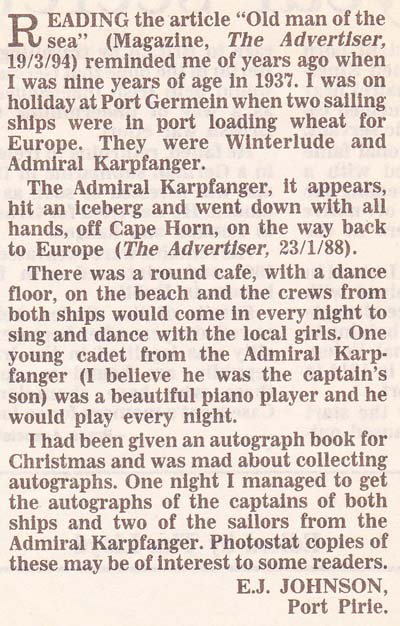 At right: A 1994 letter to 'The Advertiser' describing ships and the Palais in 1937, printed with kind permission
of Mr. E J Johnson. The captains' signatures are shown centre. N.B. The piano player was not the Captain's son.
At right: A 1994 letter to 'The Advertiser' describing ships and the Palais in 1937, printed with kind permission
of Mr. E J Johnson. The captains' signatures are shown centre. N.B. The piano player was not the Captain's son.
Mr Johnson remembers someone pointing out that the flag
flying on the main mast of the 'Admiral Karpfanger'was a swastika but he did not realise what that was until the war came.
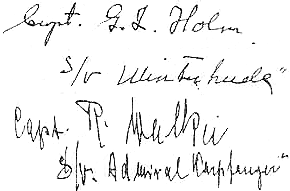
The children were not allowed on the ships but would go out to the end of the jetty to look at them, often hitching an illegal lift, together with their crabbing gear, on the back truck of the train carting the wheat bags out for loading on the ships.
Joyce Schmerl née Mickel lived at Kadina but would visit her Uncle and Auntie who lived at Wallaroo Mines at Christmas Time. Hers is a memory of the boats, not of Port Germein. A wheat boat would come in and tie up at the jetty on New Year's Eve at no cost for mooring if she remembers correctly, and a dance would be held on deck. Boats she remembers are the Pamir, Passat and Abraham Rydberg. Children were not allowed on board but they would watch from the jetty. Her uncle would whistle and people would dance to that. It was a loud whistle that could be heard from a long way. There were probably also bands. People were not necessarily dressed up as it was only "down the jetty." The children were fascinated by the sailing boats as all they had seen were rowing boats on Porters' Lagoon.
DALTON's MEMORIES
- He went to Port Germein Primary School
- His father was the last harbour master and they lived in the harbour master's house
- His father worked in the goods shed at the start of the jetty. It was sold and taken to a farm in Telowie.
- Harry Havers lit the lights in the streets.
- Harry Havers, Dalton's uncle, died on the verandah of the Port Germein pub of a heart attack. Havers Road is named after him. His wife was Emily Havers and they are buried at the Port Germein Cemetery.
- There is an old horse racing track on the road to Pt Augusta. During the war the grandstand was demolished and the galvanised iron from the grandstand was used to line a trench they dug behind the school as a shelter in case of attack.
- Dalton attended the 125th anniversary of the school.
- His grandfather was also a harbourmaster who could become violent when affected by alcohol. His grandmother had a piano and would play on that loudly to deter him when he was drunk. The piano was left in the house.
PORT GERMEIN POLICE STATION JOURNALS, 1923 and 1924
On July 1, 1923 Mounted Constable P. Thornton is the duty officer, together with his trusty mare, PM (police mount) Raffa. The distance travelled by Raffa is recorded for each trip made, together with purchases of chaff and oats and details of shoeing. Each day the constable visits Brown's Hotel and the Pier Hotel 2 or 3 times and up to 5 times on Sundays and holidays, almost always reporting "all correct."
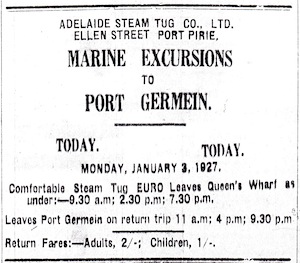 About once a month the policeman is on bailiff duty at Port Germein or Baroota and often spends time collecting statistics around Baroota.
He is apparently completing a farming statistics report for the government. The main crime seems to be drunkenness and one poor individual is arrested
twice and fined before finally being convicted as a "rogue and a vagabond" and sentenced to three months in Gladstone Gaol.
While prisoners are in the cells, meals supplied are recorded in the station journal but the cells at Port Germein are very small and the
prisoners must be transferred to Port Pirie or elsewhere for longer periods of time. This seems to happen via the coach or the constable rides out onto
the Pirie road and meets a constable from Port Pirie to transfer a prisoner.
About once a month the policeman is on bailiff duty at Port Germein or Baroota and often spends time collecting statistics around Baroota.
He is apparently completing a farming statistics report for the government. The main crime seems to be drunkenness and one poor individual is arrested
twice and fined before finally being convicted as a "rogue and a vagabond" and sentenced to three months in Gladstone Gaol.
While prisoners are in the cells, meals supplied are recorded in the station journal but the cells at Port Germein are very small and the
prisoners must be transferred to Port Pirie or elsewhere for longer periods of time. This seems to happen via the coach or the constable rides out onto
the Pirie road and meets a constable from Port Pirie to transfer a prisoner.
MC Thornton receives a letter requesting that a State Boy be sent back to the State Children's Department and later in the year another State Boy is reported missing but found in Port Pirie. A farmer also applies to be allowed a farm boy via the Department of immigration. Such events require the use of the telephone and all calls are carefully recorded with margin notes as well. There are occasional inspections of the police station by visiting senior officers and an extra officer is sent out from Pt Pirie to help patrol, especially for sporting and beach events and for New Year's Day.
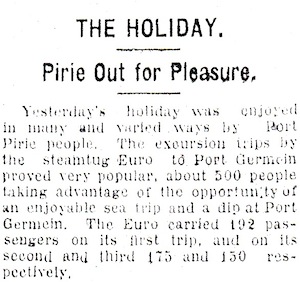 Other duties involve attending football matches or euchre and dance parties and strawberry fetes at the institute. When complaints are received about the
fencing at the Aboriginal Reserve, the policeman rides out to Baroota and investigates. The aborigines agree to repair the fences to prevent cattle wandering
on to neigbouring properties. On one occasion he is summoned to Mambray Creek to interview a man who is "off his head." The man is "acting in a peculiar way"
but the officer thinks he is suffering from the effects of drink. A number of cattle are reported missing and lengthy investigations ensue to locate
the missing animals. The same farmer reports both missing cattle and sheep, on different occasions.
Other duties involve attending football matches or euchre and dance parties and strawberry fetes at the institute. When complaints are received about the
fencing at the Aboriginal Reserve, the policeman rides out to Baroota and investigates. The aborigines agree to repair the fences to prevent cattle wandering
on to neigbouring properties. On one occasion he is summoned to Mambray Creek to interview a man who is "off his head." The man is "acting in a peculiar way"
but the officer thinks he is suffering from the effects of drink. A number of cattle are reported missing and lengthy investigations ensue to locate
the missing animals. The same farmer reports both missing cattle and sheep, on different occasions.
Other activities include inspecting a butcher about whom there have been complaints, checking on the sudden death of an infant, searching for an invalid person and following up on a car with no headlights.
The arrival of the sailing ship Kǿbenhavn is recorded as 8 am on January 1st, 1924. On January 3rd, 1924, MC Thornton has 21 days leave and is replaced by MC Howard from Pt Pirie, with his horse, PM Major. MC Howard now adds the jetty to his daily patrols and on January 12th, 1924, states that he attended a Continental on the boat "Kobenhaven" at the Port Germein jetty between 9 pm and 10 pm. It is a busy night because at midnight, Stanley Wilson reports that someone has removed his motor car from the shed at the rear of the Pier Hotel. Investigations reveal the car being driven in the main street by a man from Solomontown. He has no authority to drive and when he fails to produce his driver's licence at Pt Pirie police station within 48 hours is charged with various motor vehicle offences. The sailing boat "Kobenhaven" leaves the jetty at 8 am on Tuesday 15th January, 1924. Cases are heard at Pt Germein by JPs Hillam, Mullighan and McPhee. MC Thornton leaves the station on Tues 22nd Jan, handing it back to MC Thornton who immediately passes it to MC Robinson. PM Raffa is brought back to the station from the paddock.
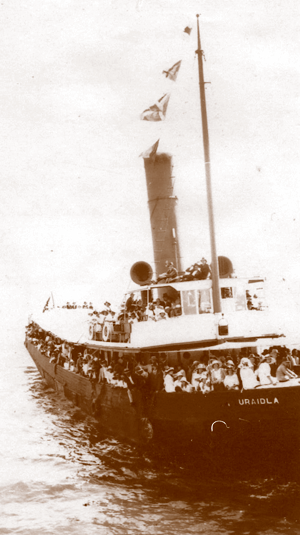 Some more events are:
Some more events are:
- Jan 23, 1924 MC Robinson receives a report of the death and burial of Louisa Karmody aged 94 at the aboriginal reserve and checks it out.
- Jan 28, 1924-patrolling the beach with a lady police officer for a picnic boat trip from Pt Pirie. Disturbance quelled at rear of Pier Hotel and at 9.30 pm the tug "Uraidla" leaves for Pt Pirie. I believe that particular day trip is shown in the photo, right. The advertisements above are for later in the 1920s but for similar excursions.
- Feb 1, inspects JH Beyer's crown lease at Baroota
- Feb 7, arrests man for drunkenness - charged and sentenced to 8 hours in police cell.
- More enquiries re missing steer
- Feb 28, "SS Jessie Darling" arrives to load wheat, leaves Feb 29
- March 8, application from Timothy Pillion, publican, to hold booth at Pigeon racing on March 11 and 12
- Local man and woman seen stealing hay-arrested and checked out. Hay was old and of Gluyas kind.
- April 30, MC Grow arrives to take over station
- Phone call requesting a lookout be kept for a body washed overboard from Pt Pirie pilot launch
- May 13, MC Mertin arrives to take over the station-PM Raffa still the police horse.
- May 21, state electoral duty in town 10-5 pm. MC Mertin regularly rides his private bicycle 14 miles on various calls but is still using the police horse, Raffa, on occasion.
- May 28, issues rations to natives-this continues on Wednesdays and Saturdays
- Oct 24-on duty at picture show and dance at Institute
Page created 13-2-2009 by L. Nordestgaard, updated 30-3-2011, checked 5-8-2017